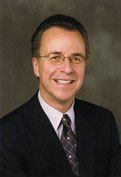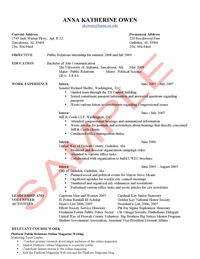Searching for an Internship? Step One—Editing Your Resume
Posted At: April 9, 2008 12:09 PM
by Anna Katherine Owen
“Thank you for your interest in our summer intern program. We have successfully received your resume and are reviewing your application. Your application number is 1046.” Don’t you hate those automated responses from internship programs that make you feel like you are one of the millions of students applying for a virtually unobtainable position?
Well, every public relations student, if not already, will soon have to go through the rigorous process of applying for summer internships. I recently applied for more than nine summer internship programs and thought it may be interesting to get a professional critique of my resume. Resumes and cover letters are noted by most professionals as what distinguishes one of the masses from the applicant who is ultimately chosen. A resume should be unique to the person’s character and the position he or she is seeking.
 Ron Culp, Ketchum Public Relations senior vice president and managing director of the Midwest operations, agreed to look over my resume and give some helpful pointers to distinguish my resume from other intern seekers. Mr. Culp has more than 30 years of experience and knows what employers like Ketchum are looking for when it comes to hiring the best and brightest interns.
Ron Culp, Ketchum Public Relations senior vice president and managing director of the Midwest operations, agreed to look over my resume and give some helpful pointers to distinguish my resume from other intern seekers. Mr. Culp has more than 30 years of experience and knows what employers like Ketchum are looking for when it comes to hiring the best and brightest interns.
Courageously, I have posted my resume with Mr. Culp’s critique below.
 What do you think is the most common error found in student resumes applying for internships?
What do you think is the most common error found in student resumes applying for internships?
Culp: “Attempting to claim or appear to have more experience than is the case.”
Is there anything that employers recognize that adds credibility to a resume?
“Employers want to see recent, relevant experience that directly translates to work that they have in front of them. Next is the need to see relevant student activities.”
How could a student sharpen the focus of their resume in a simple manner?
Culp: “Your resume does an excellent job of briefly summarizing your experience and activities. I like the format and the fact it fits on one page, but you should cut two lines in order to leave white space between the start and ending of the last two sections. It looks too cramped currently. Plus the columns under activities need to be better dilineated since they are too close. I also recommend playing down the bold designation for Intern—perhaps lead with the name of the place where you worked, followed by Intern. Perhaps Harvard or other resume guidelines have a point of view, but you want people to see where you worked—even if you simply underline Intern and bold the place of the internship. Also, you should use Summer 2007 for your first internship. It was hard to figure out the Siff & Cerda position since that seems to overlap with your internship in Senator Shelby’s office. It is important that people not get confused about the duration of your internship.
“It is also important to not just list your job description duties in your internships; cite anything that you accomplished. Employers want to see that you did things that are measurable. Did you process 2,000 passport requests? Did you write 15 articles for journals and newsletters?”
Should you list your GPA on a resume?
Culp: “Good idea on the first full-time position, but it can be dropped after you land your first job.”
What is the most important element to highlight in a resume? Is work experience more important or leadership/extracurricular activities?
Culp: “Relevant work experience trumps volunteer and leadership activities, but both are very important since prospective employers weigh each differently. You’ve nailed both.”
Do you review or accept resumes that are longer than one page?
Culp: “Yes, but they better be full of relevant information that requires more than a page. That’s generally not the case for entry-level applicants.”
Is it important, especially for public relations students, to follow AP style in their resume?
Culp: “Yes, the AP Stylebook is the safest standard to ensure the many former editors who review resumes don’t catch anything wrong with style or grammar.”
What are some of the best editing tips you have received as a result of a resume critique?


